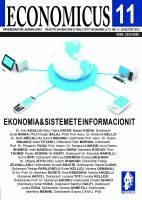Pensioni suplementar: “Kontribut për vete, jo solidaritet”
Supplementary pension: "Contribution for yourself, not solidarity"
Author(s): Aurora BINJAKU, Hysen BinjakuSubject(s): National Economy, Financial Markets, Public Finances, Human Resources in Economy
Published by: Shtëpia botuese “UET Press”
Keywords: supplementary pension; annuity measure; contribution; reference salary; employees;
Summary/Abstract: In conditions when the old-age pension is insufficient for a normal life, supplementary pension is a pension scheme that enables certain categories of employees to benefit something more than compare to general pension cheme, of course, contributing their salary during several years of work . In our country the supplementary pension schemes regulated by two laws: 1 ) Law no. 8097 , date 21.03.1996, as amended “ for supplementary state pensions of persons performing constitutional functions and state employees”. 2 ) Law no. 10139 , date 15.05.2009 “For supplementary state pensions of employees that work in Universities, high schools, Albanological Research Center, Academy of Sciences and all other public research institutions in the RA, who have scientific degrees.” We think that supplementary pension schemes should have a principle: “contribution for ourself and not for solidarity”. In this way, the scheme should be fair, in the sense all contributors should have the opportunity to receive back in proportion to the amount that they have contributed. In this paper we try to analyze these two laws and we try to give answers to these questions: Are the two laws of supplementary pension scheme coherent? How are norms respected in determining the contribution rates for different groups of employees, subject to the laws? Is the report: contribution / benefit preserved for all entities involved in the scheme? Are these laws stimulus for all categories that are subject to them? From the analysis we conclude: supplementary pension scheme, so it is built, it is not coherent, does not respect any principle or rule in determining the contributions of various groups of employees as well as the distribution of benefits arising from the scheme. Impurity contributions are determined by a percentage, ranging from 2 % to 7 % of the gross salary, but without any criterion. Similarly, the size of the supplementary retirement benefit does not take into account taxes paid for years. The law heavily favors the employee groups that have political status and punishes those groups of workers who are employed in non-public institutions such as the employees called “Professor” or “ Associate Professor”.
Journal: ECONOMICUS
- Issue Year: 11/2013
- Issue No: 1
- Page Range: 63-73
- Page Count: 11
- Language: Albanian

